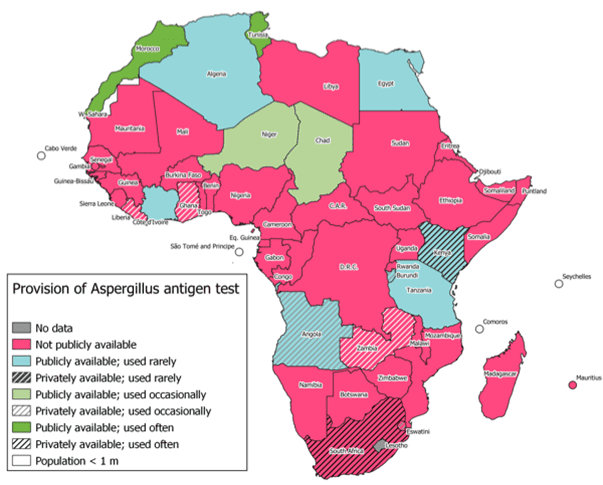The most common fungal infections in severely ill hospitalized patients are invasive aspergillosis, caused by the fungus Aspergillus and Candida bloodstream infections. These are especially common in those with cancer or in intensive care, and both infections soared in critically ill COVID-19 patients.

Published today in the Journal of Public Health and Infection[1], the authors of the diagnostic survey ‘Diagnostic capacity for cutaneous fungal diseases in the African continent’ find important gaps in WHO-recommend essential diagnostics[2] for diagnosing fungal infections – especially in Aspergillus antigen detection. The survey included 48 countries covering 99.65% of the African population.
Africa contributes up to 5.7% (equivalent to 1.1 million) of global cancer cases and 7.1% (equivalent to 700,000) of global deaths due to cancers[3].
Key findings from the study reveal:
- Blood culture for sepsis was often used in 22 (46%) African countries in the major hospitals in the public sector and in 17 (26%) African countries in the private sector.
- Aspergillus antigen was often or occasionally performed in 4 of 48 (8%) of African countries.
- Bronchoscopy to diagnose lung cancer and collect diagnostic specimens was done often or occasionally in 28 (48%) African countries in the public sector and 20 (42%) in the private sector.
Other important diagnostics were better provided for including imaging with CT scanning and MRI scans (frequent availability in 56% and 31% respectively), although only in major hospitals.
Dr Tafese Tufa of the Hirsch Institute of Tropical Medicine, College of Health Sciences, Arsi University, Asella in Ethiopia, GAFFI Country Ambassador, and lead author of the report said:
“This study sheds light on the significant gaps in access to essential diagnostic tests for invasive fungal infections in Africa, particularly among critical care and cancer patients. Addressing this gap is crucial for improving public health mycology in Africa and enabling timely diagnosis and appropriate treatment of fungal infections. Better and faster diagnosis will reduce morbidity and mortality from cancer, especially leukaemia and lymphoma.”
Dr Felix Bongomin, of the Department of Medical Microbiology and Immunology, Faculty of Medicine, Gulu University, Uganda and GAFFI Country Ambassador stated:
“Collaboration between clinicians and experienced mycology laboratories with appropriate follow-up is essential for accurate diagnosis and management. Investment in essential diagnostics for fungal infections will allow early diagnosis and commencement of targeted antifungal therapy. Optimal outcomes from complex cancer therapies and in patients in critical care will not be possible without good fungal diagnostic testing availability and capabilities across Africa.”
‘Diagnostic capacity for cutaneous fungal diseases in the African continent’ survey:
The survey was conducted in 2021-2022 by Global Action For Fungal Infections GAFFI in collaboration with the Africa Centres for Disease Control and Prevention Africa CDC. The survey findings were presented at the 2nd Conference on Public Health in Africa in Kigali in December 2022.
The research paper includes co-authors from Angola, Egypt, Morocco, Ethiopia, Sudan and Uganda.
[1] Tufa TB, Bongomin F, Fatallhah A, Cândido ALSM, Hashad R, Abdallaoui MS, Nail AA, Fayemiwo SA, Penney ROS, Orefuwa E, Denning DW. Access to the World Health Organization-recommended essential diagnostics for invasive fungal infections in critical care and cancer patients in Africa: a diagnostic survey. J Public Health Infect. Tufa WHO diagnostics for IFIs in cancer ICU Africa J Pub Health Infect 2023
[2] https://www.who.int/teams/health-product-policy-and-standards/assistive-and-medical-technology/medical-devices/selection-access-and-use-in-vitro
[3] Mathers CD, Loncar D.Projections of global mortality and burden of disease from 2002 to 2030. PLoS Med 2006;3:e442; and https://gco.iarc.fr/today/data/factsheets/populations/903-africa-fact-sheets.pdf


